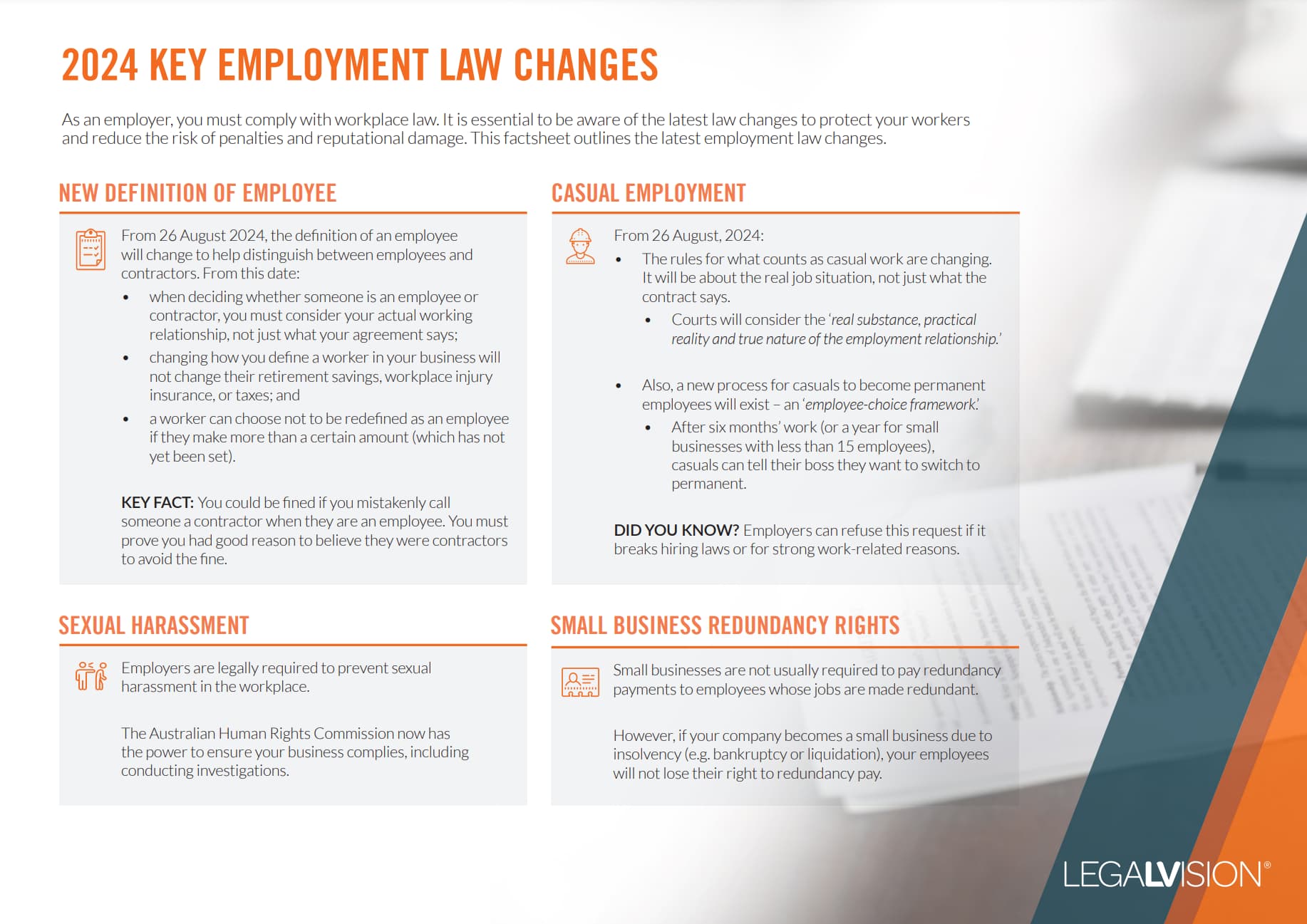Within any business, there are employees with different home lives and responsibilities. When an employee’s family falls ill or is unwell, they ask to use their carer’s leave to look after their children or other family members. As an employer, you are required to afford them leave under the Fair Work Act 2009 (Cth) (‘FWA’). This article outlines what leave entitlements employees have and how best to ensure that you are meeting your obligations.
What is Carer’s Leave?
Under the FWA, permanent employees are entitled to paid personal/carer’s leave. This paid entitlement does not apply to casual employees or contractors.
This entitlement forms part of the National Employment Standards (‘NES’). Personal/carer’s leave is available for permanent employees when they are unfit or unable to perform because they are:
- not fit for work due to a personal illness or personal injury; or
- required to provide care or support to a member of their immediate family or household due to a personal injury or illness, or an unexpected emergency.
This entitlement is equivalent to 10 days per year of service. It is important to note that this does not accrue automatically. Carer’s leave will accrue progressively throughout the year of service according to your employee’s ordinary hours of work.
Unlike annual leave, you do not have to pay out any accrued personal/carer’s leave when your employee leaves your business. However, modern awards or enterprise agreements may include terms that permit your employee to cash out their paid personal/carer’s leave.
What about Casual Employees?
Whilst casual employees are not entitled to paid carer’s leave under the NES, they are still entitled to two days of unpaid carer’s leave. Similar to paid carer’s leave, they may use this on each occasion a member of their immediate family or household requires care or support due to a:
- personal illness or injury; or
- unexpected emergency..
Who is in the Immediate Family?
An employee’s child always falls within this definition of immediate family. However, it is important for you to note that this entitlement extends to the care of:
- children of your employee’s current or former spouse or de facto partner that are not directly related to your employee;
- stepchildren; and
- adopted children.
Can I Ask for Proof?
Employees must provide you with notice that they are unable to attend the workplace due to their carer’s responsibilities and wish to take carer’s leave. This notice must:
- be given to you as soon as possible (which may be a time after the leave has started); and
- advise you of the period, or expected period, of the leave.
Similarly to when an employee seeks to take personal/carer’s leave when they are unfit to work due to injury or illness, you are permitted to ask for reasonable proof or evidence. This proof may include:
- proof of medical appointments;
- medical certificates from relevant medical practitioners; or
- a statutory declaration.
Whilst you may be permitted to ask for evidence and or proof, it may be best to operate on a discretionary basis to ensure a healthy working relationship with your employees. If your employees are covered by a modern award or enterprise agreement, these industrial instruments may include terms relating to what evidence they must provide.

As an employer, it is essential to understand what employment laws have changed and their implications for your business — particularly the changes to the Fair Work Act 2009 through the new Closing the Loopholes legislation.
What Happens if an Employee Has No Accrued Carer’s Leave?
Under the Act, employees are entitled to up to two days unpaid carer’s leave for each occasion an immediate family member, such as a child, requires care or support. This period of leave can be taken either in:
- a single continuous period of up to two days; or
- separate periods if both you and the employee agree.
If an employee is required to care for their child or children for a period greater than two days, you and your employees may come to an agreement for the employee to take further unpaid leave. However, it is important to note that:
- employees do not accrue further entitlements such as annual leave whilst on a period of unpaid leave; and
- unpaid leave does not break an employee’s continuous service with your business.
Key Takeaways
The amount of carer’s leave your employee will be able to access depends on their type of employment and amount of accrued leave. As an employer, some key things you should remember moving forward include that:
- all employees have access to carer’s leave to look after their children;
- permanent employees are entitled to paid carer’s leave;
- casual employees are entitled to unpaid carer’s leave; and
- you can reasonably require your employees to provide you with notice and proof of their inability to attend work.
If you need assistance understanding your employee’s entitlements, our experienced employment lawyers can assist as part of our LegalVision membership. For a low monthly fee, you will have unlimited access to lawyers to answer your questions and draft and review your documents. Call us today on 1300 544 755 or visit our membership page.
We appreciate your feedback – your submission has been successfully received.











